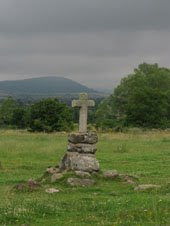 “Notre grand Guillaume,” the guide in the Abbeye des Hommes in Caen called him, and I was struck by the affection in her voice. Was she saving our feelings by avoiding the word “Conqueror”? Or did William, Duke of Normandy and King of England, simply have a significance here separate to his role in English history?
“Notre grand Guillaume,” the guide in the Abbeye des Hommes in Caen called him, and I was struck by the affection in her voice. Was she saving our feelings by avoiding the word “Conqueror”? Or did William, Duke of Normandy and King of England, simply have a significance here separate to his role in English history?
Between Winchester, Bayeux and Caen we have bumped into this tall, blond man a number of times. The first surprise (I didn’t pay attention in school) was that he had his palace in Winchester rather than London. Winchester is so old and small I easily pictured the scenes around his palace on the hill.
The second surprise was that he was actually chosen as King by Edward the Confessor – a good guy, no? It was only Our 'Arold’s treachery in snapping the Crown for himself that led to the whole invasion/conquoring thang.
The third surprise was his tallness and blondness. Attributes I had, since school, ascribed to Harold rather than some pesky little Frenchman.
We debated long whether such far-off events had any importance to us today; modern citizens of Europe and the world. But the fact of my surprise and emotional reassessment in favour of William showed me that our legends, even those served up by school teachers as History, hold fast pieces of the mosaic that is our sense of self, however subconscoiusly. However erroneously: history being written by the winners, after all.
What was the impact of William’s invasion of England? An entrenching of a continental version of feudalism, harsher and creating greater inequalities than that already in place. The rapid and deliberate replacement of Anglo-Saxon bishops and lords with cronies brought over from Normandy. And the equally rapid building of castles, cathedrals and churches in the alien-looking “Norman” or Romanesque style in stone brought over from William’s native Caen. All acts of a conqueror determined to brand his legitimacy on a disgruntled nation. But also a legacy of high intellectual scholasticism in the Church.
The Norman style paved the way for Gothic architecture to also cross the Channel, both of which styles England made its own. So much so that, after the passing of centuries when the Victorians sought a model of an upright, honourable, honest, simpler English society after years of decadence and frivolity, it was to Chivalry and the “Gothic” that they turned. They renovated and rebuilt parish churches across the land in their search for a traditional ‘Old England’; copying styles that had once seemed so foreign, so imposing.
So is 1066 at all important? With a slight re-writing of the tale William would have arrived as the legitimate successor; and the systems of law and society, the grand buildings, the purification of the Church would all have taken place, though more slowly. In Normandy, William is held as great for the strength of his rule and his generosity in founding religious houses, his support for learning. We would have lost our role model, as a nation, for the herioc failure of Harold.
At the time rulers were from a pan-European network of family ties and allegiences. The other great power in the land, the bishops, listened more closely to the Pope in Rome or the edicts of their foundation abbeys in France than they did to people living on the land beyond their walls. They were non-nationalistic in their sensibilities, with wide horizons and a taller motivation. European, in a way we should aspire to. At least, that’s how I read the legends of my history. Which is why I felt so uneasy at the Union Jacks flying patriotically outside farmhouses in Hampshire.
At least, that’s how I read the legends of my history. Which is why I felt so uneasy at the Union Jacks flying patriotically outside farmhouses in Hampshire.
Thursday, 17 January 2008
Beyond 1066
Posted by
Rachel Escott
at
14:01
![]()





































































3 comments:
Glad to see things are going well so far.
As for the musings about whether William was good or bad, I'd stick with the Tralfamadorians - so it goes.
Glad to see things are going OK. Tried to comment before but I'm crap with technology. Hope this works OK
Lots of time to think on a walk I'm sure.
Can't say I've mused much on 1066.
Hope it's not just laziness if I just stick with the Tralfamadorians about the rights and wrongs of history.
Well, there are clearly gaps in my knowledge. Not only do I not know what a Tralfamadorian is, I can't even pronounce it. Some Wiki time is needed, I think ...
Post a Comment